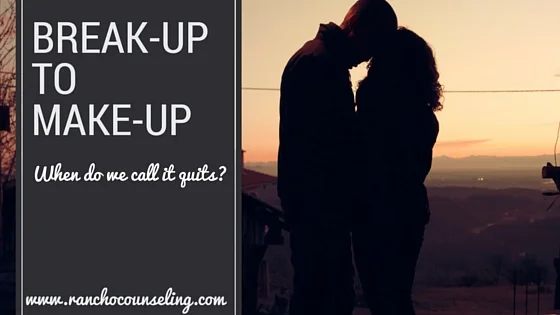Break-up, to Make-up. When do we call it quits? + Bonus Video!
Whether you love them or hate them, you can’t cross a checkout stand without catching a glimpse of the latest Kardashian drama. In the wake of Kloe and Lamar’s latest drama, and reconciliation, many are wondering if calling off their divorce is a good idea. While their case may seem extreme, these things do happen to people who aren’t celebrities, but when is it a good idea to reconcile, and when do you call it quits?
The answer to this question is different for every couple, and when marriage and children are involved, that adds additional variables to the equation and typically keeps people together longer and trying to work through the issue. I’ve put together a list of things that could be considered deal-breakers, and that I recommend seeking counseling for:
1. You don’t feel valued or respected for the person that you are.
When you don’t feel as though you can show up in your relationship as your true, authentic self for fear of the negative reaction or judgment of your partner, this may be a sign of deeper issues that should be explored and discussed. Things like differences in values, life-goals, and roles can cause arguments and disagreements, but seeking a therapist in order to assist you in uncovering the root of this issue can be beneficial.
2. You aren’t the only one.
Although the research shows that more and more couples are staying together after infidelity, it can be difficult to weather this storm. It takes two people who are ready to look at themselves, take responsibility for what lead to the affair, and come to an agreement as to what the relationship will look like going forward. This can be a new start to a new relationship, but one that won’t come easy, and therapy can help speed things up a bit in terms of the conversations that need to be had in order to get to a better place.
3. You aren’t fighting fair.
When fights look like all-out, gloves off brawls, this can be extremely destructive to your relationship. Things like name-calling, put-downs, and an inability to argue about just one thing are all signs that you may be doing irreparable damage to your relationship. These types of arguments often cause resentment, and over time that resentment leads to separation and divorce. Therapy can be a great place to learn how to fight fair.
4. Harmful habits are taking over.
If your partner is unable to get a handle on a harmful addiction, this is definitely a good time to seek help from an outsider. When your life is endangered due to the risky behaviors of your partner, or you feel like the addiction is consuming a majority of your interactions, it’s time to take a look at the relationship and consider making some major changes. Addictions can be tricky, but ultimately the responsibility for making changes falls on the addict, and playing the waiting game without becoming an enabler can cause a huge amount of stress.
5. Trust is broken and irreparable.
Trust is one of the most important factors in any relationship, and when it becomes broken for any reason, it can take a great amount of time, effort, and dedication to restore. If you feel as though the trust has been lost in your relationship, and it happens more than once, going through that restoration process once more can take a huge toll, and make the process longer and more difficult with each go-around. Doing the same thing over and over again in hopes of a different result is sometimes called insanity, and while I wouldn’t consider it that severe, I definitely think it’s exhausting, and getting support to assist in sorting through trust issues can be helpful.
With any of these deal-breakers, deciding to stay in the relationship and work on things is a personal preference. Seeking assistance from a therapist can help you cut down on the amount of time you might spend working through things on your own, and help you to uncover things that can assist you in making the decision to end the relationship.
When clients decide that they are in fact going to end their relationships while in therapy, the splits typically happen in a more amicable fashion, and one or both partners can continue to receive support. If you can use support with any the issues mentioned above, I’d love to hear from you. Feel free to give me a call at (909) 226-6124 for a free 15-mintue consultation where we can talk about ways you might benefit from therapy.
As a bonus this week, I’ve included a video follow-up to last week’s blog post where I discuss a few tips for communicating with your partner, if you feel they’ve crossed a boundary in your relationship. You can check it out below:

